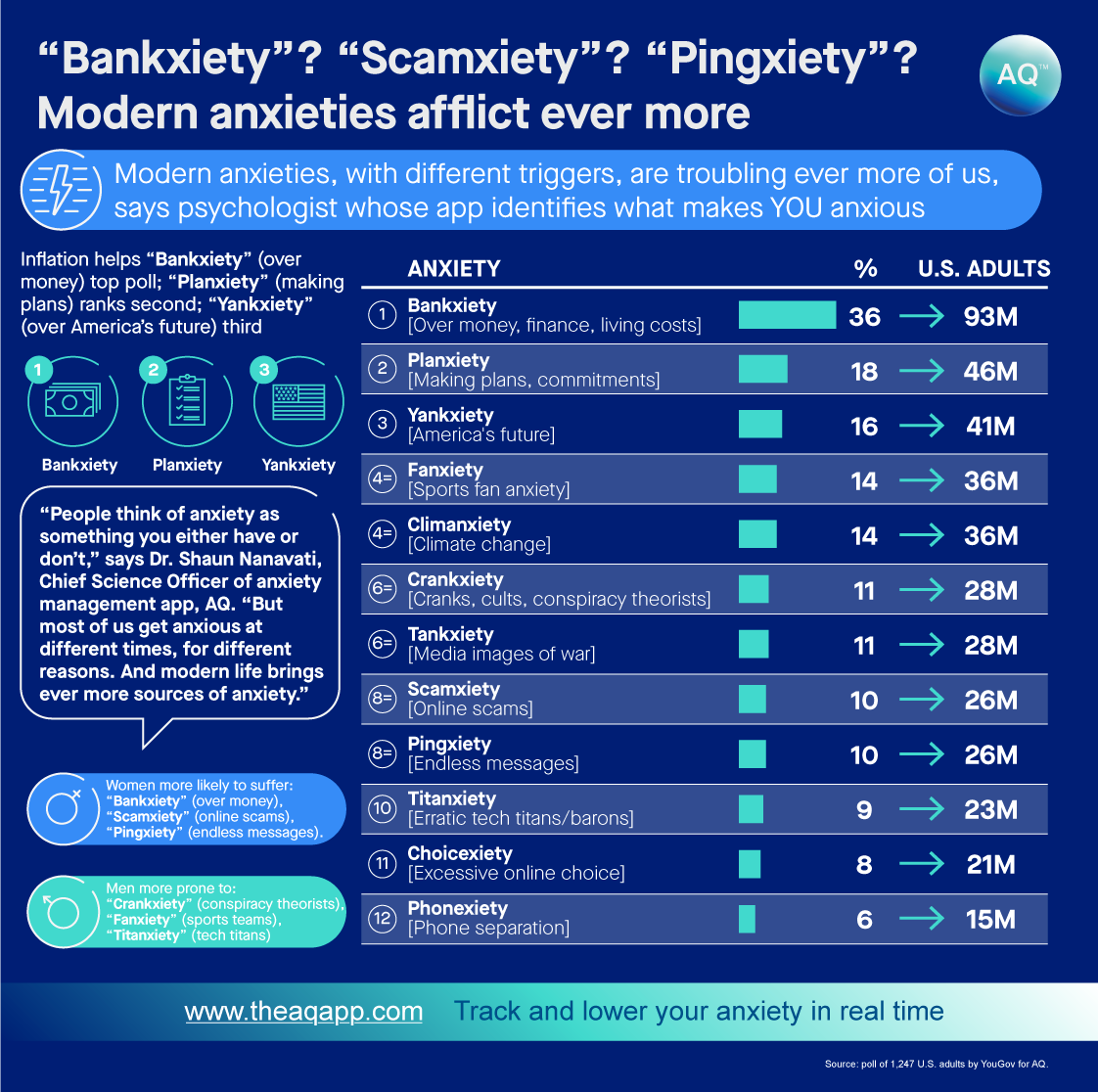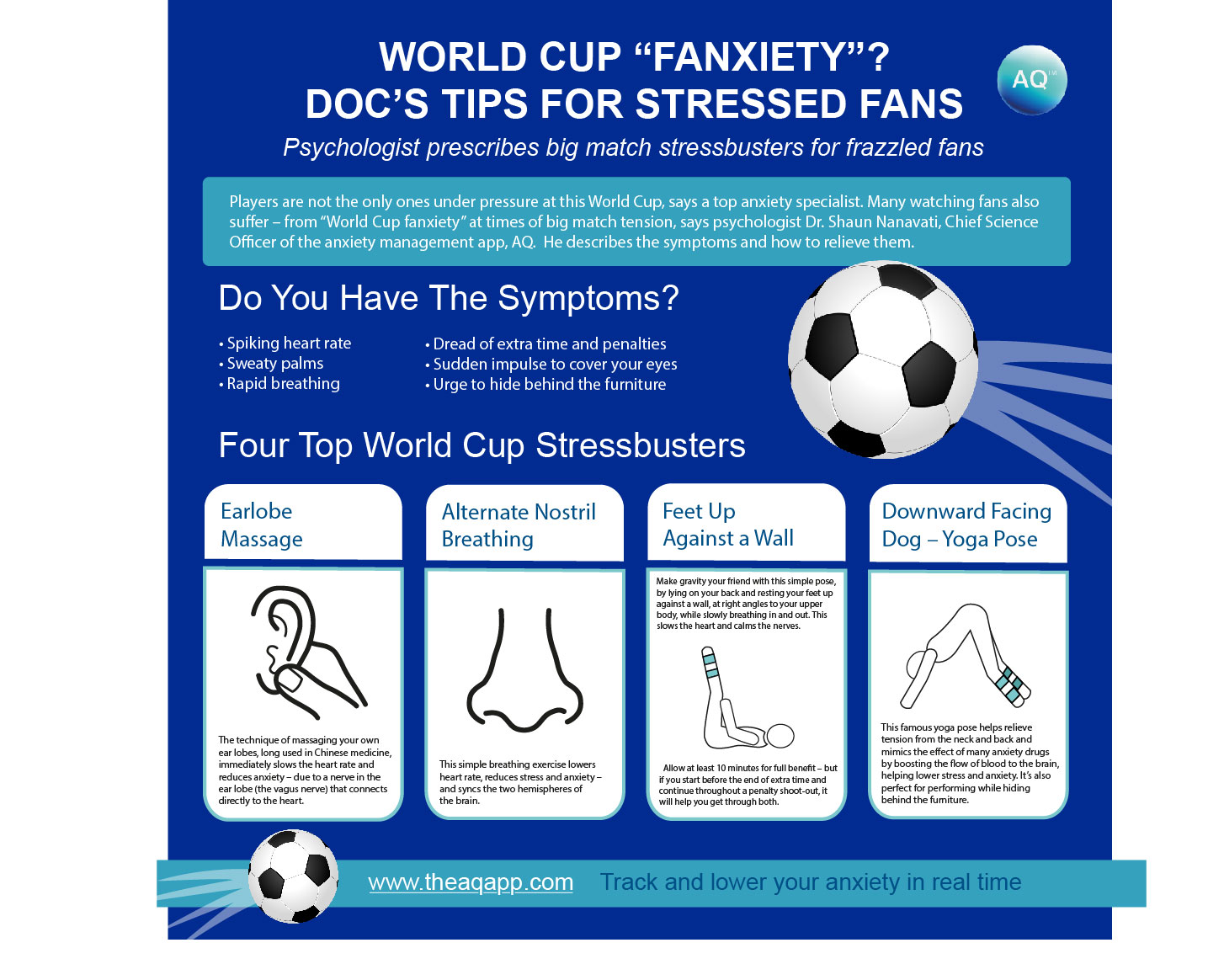-
Modern anxieties are troubling ever more Americans, says the Chief Science Officer of AQ, the app that identifies what makes YOU anxious
-
Inflation helps make “Bankxiety” (over money) commonest worry; “Planxiety” (making plans) second; “Yankxiety” (America’s future) third
-
Women more prone than men to “Bankxiety”, “Scamxiety” (online scams), “Pingziety” (endless messages)
-
Men more prone to “Crankxiety” (over conspiracy theorists), “Fanxiety” (sports teams), “Titanxiety” (tech titans)
-
Young feel most “Climanxiety”, “Planxiety”, “Scamxiety”
-
Americans more likely than Brits to suffer “Crankxiety”, “Yankxiety” (over America’s future), “Titanxiety” (over tech titans)
“Bankxiety”, “Planxiety” and “Scamxiety” are among a dozen kinds of modern anxiety that are afflicting ever more Americans, says a top psychologist.
Even such new-fangled worries as “Yankxiety” (over America’s future), “Pingxiety” (over endless messages) and “Titanxiety” (erratic tech titans) have struck millions of Americans – reveals a survey of 1,274 Americans conducted by pollsters YouGov, on behalf of AQ, a new anxiety management app that tracks your anxiety in real-time.
AQ has given such names to the diverse kinds of modern anxiety to highlight the fact that anxiety has many causes and triggers.
“People think of anxiety as something you either have or don’t”, says Dr. Shaun Nanavati, neuropsychologist and Chief Science Officer of AQ. “And if you DO have it, that makes you an anxious person.
“But the truth is that most of us get anxious at different times, over some things but not others. And modern life brings ever more new sources of anxiety.”
By tracking your anxiety in real time, AQ helps you understand what makes you anxious.
The three most common kinds of modern anxiety in AQ’s poll were respectively:
- “Bankxiety” (“over your bank balance, finances, the cost of living”)
- “Planxiety” (“over having to make plans or commitments”)
- “Yankxiety (“over what some feel is the worrying polarization of and discord in the U.S. and/or even the future of U.S. democracy”).
93 million Americans (36% of U.S. adults) have experienced “Bankxiety” over their finances, while even 23 million (9%) have felt “Titanxiety”, over “unpredictable tech barons and what they might say or do next”.
“The fact that ‘Bankxiety’ is so widespread makes sense at a time of inflation”, says Dr. Nanavati. “It’s also interesting because people often spend money to relieve their anxiety – to provide a sense of control over their environment.”
Gender and Age Differences
There were also significant gender and age differences in the likelihood of experiencing different kinds of anxiety.
Women were considerably more likely than men to have suffered “Bankxiety” (felt by 41% of women vs 30% men), “Planxiety” (22% women vs 14% men) and “Scamxiety” (over online scams: 12% women vs 8% men)
Women were also more likely than men to have suffered:
- “Tankxiety” (“over repeated images of war, destruction on the news/media/social media”: 13% women vs 7% men)
- “Pingziety” (“over trying to keep up with endless emails, texts and messages”: 11% women vs 8% men)
- “Choicexiety” (“over having to decide and finally pick the perfect restaurant, hotel or holiday property rental, or online purchase, after doing exhaustive online research”: 9% women vs 6% men).
Men, in contrast, were noticeably more likely than women to have experienced:
- “Fanxiety” (“felt by sports fans watching their team in a big and/or tense game”: 16% men vs 12% women)
- “Crankxiety” (over the growth of cranks, cults and conspiracy theorists: 13% men vs 9% women”)
- “Hangxiety” (during a hangover: 7% men vs 4% women)
The youngest respondents (age 18-24) were far more likely than the oldest ones (55+) to have felt “Climanxiety” (over climate change: 25% vs 10%), “Planxiety” (making plans or commitments: 28% vs 15%) and “Scamxiety” (16% vs 10%).
National Differences
Americans, meanwhile, were significantly less likely than Britons to have experienced “Planxiety” (felt by 18% in the US vs 23% UK), “Fanxiety” (14% U.S. vs 17% UK) and “Climanxiety” (over climate change: 14% US vs 18% UK).
Indeed, Americans were less likely than Brits to have felt anxious over most things – and just half as likely as Brit to have felt “Hangxiety” (5% U.S. vs 10% UK)
Americans, however, were more likely than Brits to have felt “Crankxiety” (11% U.S. vs 9% UK), “Titanxiety” (9% US vs 7% UK) and, unsurprisingly, “Yankxiety” (16% US vs 7% UK).
NOTES FOR EDITORS
Contact: press@theaqapp.com
The precise wording used in the poll questions to describe the various different types of anxiety was as follows:
- [Bankxiety] “Anxiety over your bank balance, finances, the cost of living”
- [Planxiety] “Anxiety having to make plans or commitments”
- [Yankxiety] “Anxiety over what some people feel is the worrying polarisation of and discord in the U.S. and/or even the future of U.S. democracy”
- [Fanxiety] “Anxiety felt by sports fans watching their team in a big and/or tense game”
- [Climanxiety] “Anxiety over climate change, global warming and the environment”
- [Crankxiety] “Anxiety the growth of cranks, cults and conspiracy theorists”
- [Tankxiety] “Anxiety triggered by viewing repeated images of war and destruction on the news/media/social media”
- [Scamxiety] “Anxiety over the risk of being scammed online”
- [Pingxiety] “Anxiety over trying to keep up with endless emails, texts and messages”
- [Titanxiety] “Anxiety over the behavior of powerful and unpredictable tech barons and what they might say or do next”
- [Choicexiety] “Anxiety over having to decide and finally pick the perfect restaurant, hotel or holiday property rental, or online purchase, after doing exhaustive online research”
- [Phonexiety] “Anxiety that some people feel if/while separated from their phone or phone connectivity”
•
- Figures for how many millions of Americans have experienced particular anxieties were calculated by taking the percentage of poll respondents who had felt that particular anxiety and applying it to the total number of U.S. adults, age 18+ (258.3M) in the last U.S. Census (2020).
- AQ’s poll was not referring to anxiety as a diagnosed severe mental health condition but instead to mild to moderate feelings of anxiety that almost everyone experiences at different times.
Methodology: U.S. poll: All figures, unless otherwise stated, are from YouGov Plc. Total sample size was 1,247 U.S. adults. Fieldwork was undertaken online between January 25th-27th, 2023. The figures have been weighted and are representative of all U.S. adults (aged 18+).
Methodology: UK poll: All figures, unless otherwise stated, are from YouGov Plc. Total sample size was 2,095 UK adults. Fieldwork was undertaken online between 24th-25th January 2023. The figures have been weighted and are representative of all US adults (aged 18+).
ABOUT AQ: AQ is the world’s first app that tracks and measures your anxiety and mental health in real time – and provides targeted, real-time advice and treatments to manage your anxiety and improve your mental health and performance. Created by Mindwell Labs, AQ is your personal mental health coach, in your pocket. AQ’s patent-pending proprietary technology and AI analyze your vitals collected by your Apple Watch in real-time throughout the day to help you understand what in your life makes you anxious or calm. AQ uses your mental health profile to provide you with personalized care based on your specific needs. You currently need an Apple Watch to use AQ but will soon be able to use any smartwatch.
AQ is available for free download on the App Store; try the premium version, with full personalization and all features, totally free for 14 days; pay $39.99/year or $4.99/month afterwards.
Contact: press@theaqapp.com





